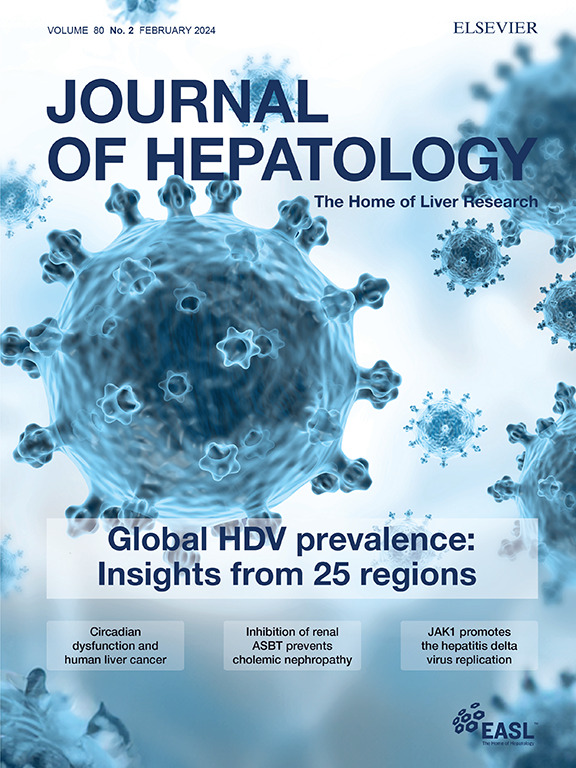慢性乙型肝炎的患者报告结果:布来韦肽 III 期 MYR301 试验的探索性分析。
IF 26.8
1区 医学
Q1 GASTROENTEROLOGY & HEPATOLOGY
引用次数: 0
摘要
背景与目的:每日一次使用布来韦肽治疗慢性乙型肝炎(CHD)的耐受性良好,且血液中的HDV RNA和肝病生化活动度显著降低。本研究探讨了为期48周的布来韦肽治疗对CHD患者健康相关生活质量(HRQoL)的影响:在一项开放标签、随机的3期试验中,150名患有冠心病和代偿性肝病的患者按肝硬化状态进行分层,并按1:1:1的比例随机接受无治疗(对照组)、布来韦肽2毫克/天或布来韦肽10毫克/天的治疗,为期48周。在基线、24 周和 48 周时,通过以下患者报告结果 (PRO) 工具对 HRQoL 进行评估:EQ-5D-3L、肝炎生活质量问卷(HQLQ)和疲劳严重程度量表(FSS):治疗组(2 毫克,49 人;10 毫克,50 人)和对照组(51 人)的患者特征和 HRQoL 评分在基线时是平衡的。与对照组相比,接受2毫克布来韦肽治疗的患者在角色体能、肝炎特异性限制和肝炎特异性健康困扰等HQLQ领域均有显著改善。与对照组相比,接受布来韦肽治疗的肝硬化患者在一般健康、肝炎特异性局限性和肝炎特异性健康困扰方面的得分均高于对照组。在整个治疗过程中,各治疗组的 FSS 评分保持稳定。第48周时,与对照组相比,2毫克组患者在EQ-5D-3L视觉模拟量表上的健康状况较基线平均改善幅度更大:PROs表明,布来韦肽单药治疗48周可改善冠心病患者的HRQoL:布来韦肽 2 毫克是欧盟唯一获准用于慢性乙型肝炎 (CHD) 患者的治疗药物。与慢性乙型肝炎患者相比,慢性乙型肝炎患者的生活质量评分更低。布来韦肽治疗 48 周可降低 HDV RNA 和丙氨酸氨基转移酶水平,且慢性乙型肝炎患者耐受性良好。这项研究首次表明,与未接受治疗的患者(对照组)相比,接受布来韦肽治疗 48 周的患者在身体和肝炎相关生活质量方面均有所改善:临床试验注册:ClinicalTrials.gov Identifier,NCT03852719。本文章由计算机程序翻译,如有差异,请以英文原文为准。

Patient-reported outcomes in chronic hepatitis delta: An exploratory analysis of the phase III MYR301 trial of bulevirtide
Background & Aims
Once-daily treatment of chronic hepatitis delta (CHD) with bulevirtide is well tolerated and associated with significant reductions in HDV RNA in the blood and in biochemical liver disease activity. This study explored the effects of 48-week bulevirtide treatment on health-related quality of life (HRQoL) in patients with CHD.
Methods
In an open-label, randomised, phase III trial, 150 patients with CHD and compensated liver disease were stratified by cirrhosis status and randomised 1:1:1 to no treatment (control), bulevirtide 2 mg/day, or bulevirtide 10 mg/day for 48 weeks. HRQoL was evaluated by the following patient-reported outcome instruments at baseline, 24 weeks, and 48 weeks: EQ-5D-3L, Hepatitis Quality of Life Questionnaire, and Fatigue Severity Scale.
Results
Patient characteristics and HRQoL scores were balanced at baseline between the treatment (2 mg, n = 49; 10 mg, n = 50) and control (n = 51) groups. Patients receiving 2 mg bulevirtide reported significant improvements compared with controls on the Hepatitis Quality of Life Questionnaire domains of role physical, hepatitis-specific limitations, and hepatitis-specific health distress. Numerically higher scores for general health, hepatitis-specific limitations, and hepatitis-specific health distress domains were reported by patients with cirrhosis who received bulevirtide vs. controls. Fatigue Severity Scale scores remained stable across treatment groups throughout. At week 48, patients in the 2 mg group showed greater mean improvement from baseline in health status compared with controls on the EQ-5D-3L visual analogue scale.
Conclusion
Patient-reported outcomes indicate that 48-week treatment with bulevirtide monotherapy may improve aspects of HRQoL in patients with CHD.
Clinical trial registration
ClinicalTrials.gov Identifier, NCT03852719.
Impact and implications
Bulevirtide 2 mg is the only approved treatment for patients with chronic hepatitis delta (CHD) in the EU. Patients with CHD have worse quality of life scores than those with chronic hepatitis B. Bulevirtide treatment for 48 weeks reduced HDV RNA and alanine aminotransferase levels and was well tolerated among patients with CHD. For the first time, this study shows that patients who received bulevirtide therapy for 48 weeks reported improvements in physical and hepatitis-related quality of life domains compared with those who did not receive therapy (control group).
求助全文
通过发布文献求助,成功后即可免费获取论文全文。
去求助
来源期刊

Journal of Hepatology
医学-胃肠肝病学
CiteScore
46.10
自引率
4.30%
发文量
2325
审稿时长
30 days
期刊介绍:
The Journal of Hepatology is the official publication of the European Association for the Study of the Liver (EASL). It is dedicated to presenting clinical and basic research in the field of hepatology through original papers, reviews, case reports, and letters to the Editor. The Journal is published in English and may consider supplements that pass an editorial review.
 求助内容:
求助内容: 应助结果提醒方式:
应助结果提醒方式:


